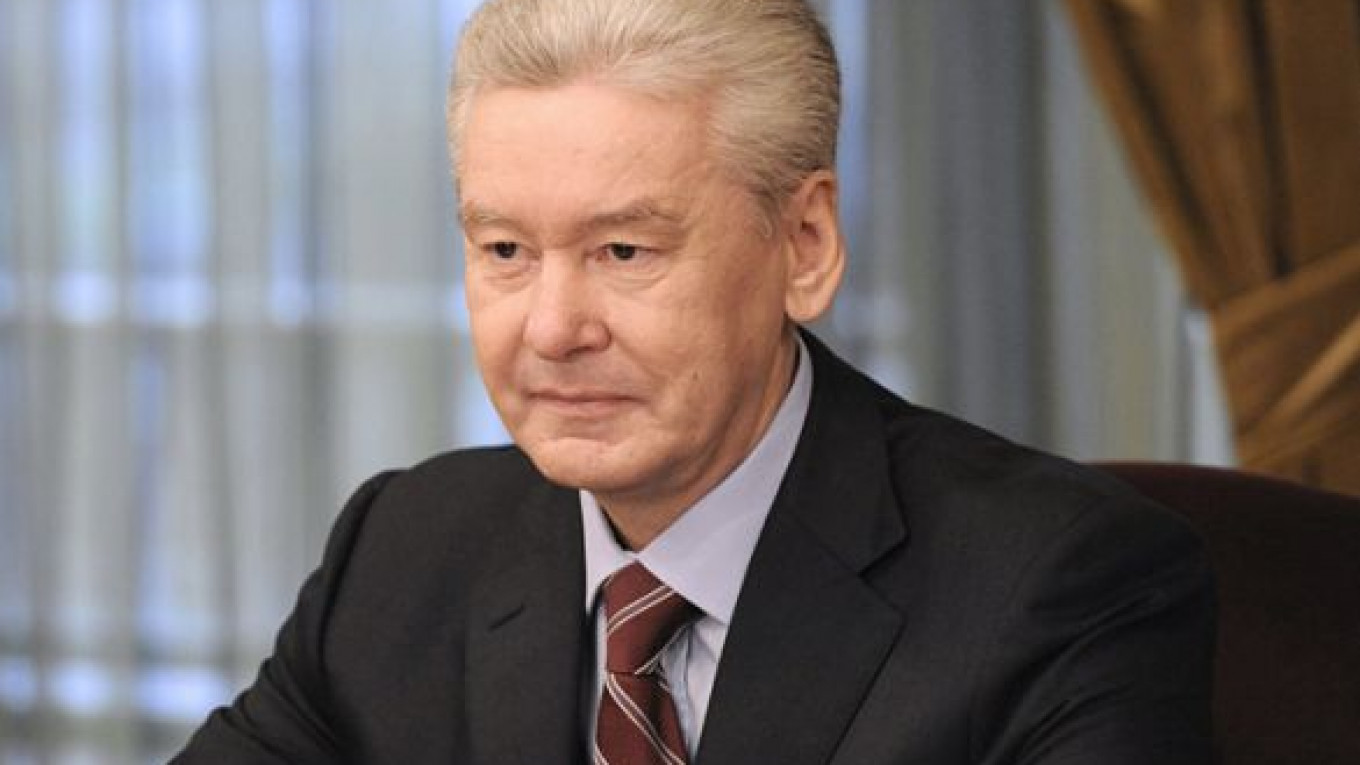Moscow Mayor Sergei Sobyanin is among the few politicians capable of appeasing warring factions within the ruling elite and becoming President Vladimir Putin's successor, a report released Tuesday said.
The report, drafted by the influential Minchenko Consulting Group, said that although there exists a broad consensus within Putin's inner circle that the president should run for a fourth term in 2018, Kremlin power brokers are considering alternative scenarios that would see Putin hand the reins of power to a trusted successor.
Some observers are now touting Sobyanin as that successor, citing his close ties with regional elites and Prime Minister Dmitry Medvedev's waning influence since he stepped aside last year to make way for his mentor to run for a third term as president.
The report's authors noted that the struggle for the post of prime minister would be a key component of the battle to succeed Putin, given that it bestows on the holder the role of "automatic successor" in the event that Putin is forced to leave the presidency.
Former Finance Minister Alexei Kudrin and Defense Minister Sergei Shoigu were also mentioned in the report as potential heirs apparent, although Shoigu's religious background as a Buddhist and Kudrin's image as a liberal out of touch with the population were cited as factors complicating their selection.
In early February, Sobyanin came in 8th in a monthly ranking of the country's 100 most influential politicians compiled by Nezavisimaya Gazeta, while Shoigu placed 7th and Kudrin 73rd.
Sobyanin's hand appears to be strengthened by the fact that he served as head of the Kremlin administration during Putin's second term as president and enjoyed high approval ratings during his five-year stint as Tyumen region governor, from 2001 to 2005. He also has a support base of like-minded governors in the Urals, according to the report.
In his current role, Sobyanin has access to the largest bureaucratic apparatus and greatest financial resources in the country after Putin himself, and analysts said the country's tycoons would welcome Sobyanin taking over the Kremlin.
"Sobyanin is a figure who could please both the main tycoons in the energy industry and those who took part in dividing the spoils inherited from [former Mayor Yury] Luzhkov's Moscow," Yevgeny Minchenko, head of Minchenko Consulting Group and lead author of the report, said by phone. "In the eyes of the elites, Sobyanin has an established, positive track record. They see him as a mediator who can safeguard their interests."
Minchenko said elites perceive Sobyanin differently from Luzhkov, who reportedly entertained presidential ambitions at the end of the 1990s. Sobyanin has positioned himself as a compromise figure, whereas "Luzhkov sold himself as a sort of new, kind tsar," he said.
On an international level, Sobyanin would be following in the footsteps of former French President Jacques Chirac were he to assume the president's post. Chirac served as Paris mayor for almost 20 years before becoming head of state, while New York City Mayor Michael Bloomberg has frequently been mentioned as a possible presidential candidate in the U.S.
Alexei Makarkin, deputy head of the Center for Political Technologies, said that speculation concerning Putin's successor was "decidedly premature" and that Putin is only likely to decide whether to run for a fourth term around the time of the 2016 State Duma elections.
"If Vladimir Putin decides to run, he will likely install a puppet figure as prime minister, as there won't be a need for a strong politician alongside him," Makarkin said. "But if he decides not to run, the incumbent prime minister will likely take over."
According to Gleb Pavlovsky, a political analyst and former Kremlin insider, Sobyanin could be made prime minister as soon as the fall if Putin decides on a major reshuffle of Medvedev's Cabinet.
Pavlovsky cautioned, however, that there remained many other viable candidates willing to step into Medvedev's shoes and that the premiership didn't necessarily equate with being declared Putin's anointed successor.
Analysts consulted by The Moscow Times agreed that Sobyanin had emerged as an authoritative figure since his appointment as Moscow mayor in 2010 and that Putin clearly trusts him.
"But if any of the players mentioned in the report — including Sobyanin — expresses their presidential ambitions, they won't be chosen to succeed Putin," Makarkin said.
Contact the author at a.winning@imedia.ru
Related articles:
A Message from The Moscow Times:
Dear readers,
We are facing unprecedented challenges. Russia's Prosecutor General's Office has designated The Moscow Times as an "undesirable" organization, criminalizing our work and putting our staff at risk of prosecution. This follows our earlier unjust labeling as a "foreign agent."
These actions are direct attempts to silence independent journalism in Russia. The authorities claim our work "discredits the decisions of the Russian leadership." We see things differently: we strive to provide accurate, unbiased reporting on Russia.
We, the journalists of The Moscow Times, refuse to be silenced. But to continue our work, we need your help.
Your support, no matter how small, makes a world of difference. If you can, please support us monthly starting from just $2. It's quick to set up, and every contribution makes a significant impact.
By supporting The Moscow Times, you're defending open, independent journalism in the face of repression. Thank you for standing with us.
Remind me later.


